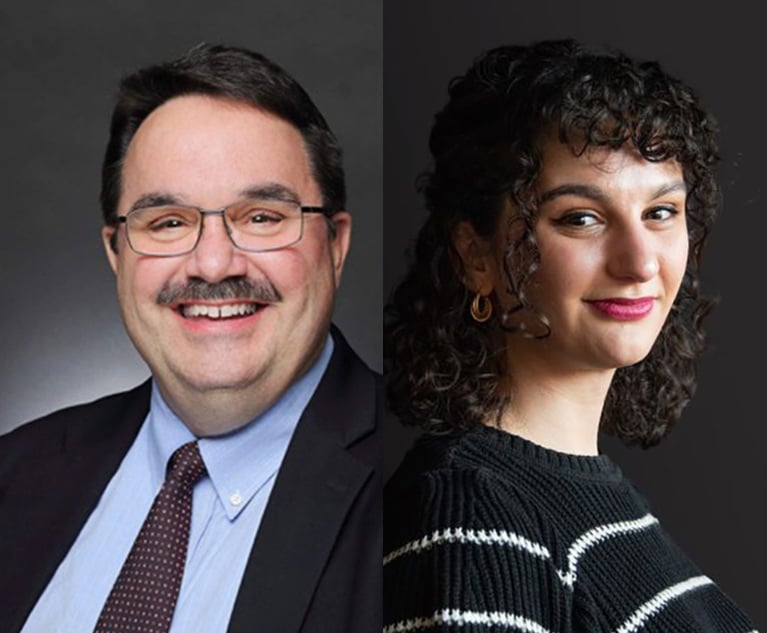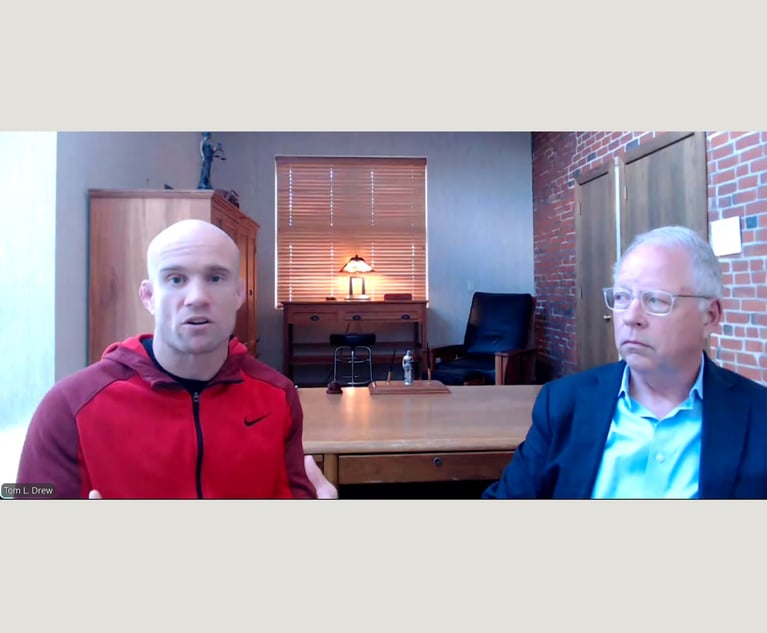 Image: Shutterstock
Image: ShutterstockIllinois Bar Accuses Civil Rights Lawyer of Faking Cancer to Delay Cases
Bar authorities claim a former lawyer at Chicago's Loevy & Loevy lied about having stomach cancer and then lied about having a son who suffered from the same disease.
February 11, 2019 at 03:12 PM
5 minute read
The original version of this story was published on The American Lawyer
Bar disciplinary authorities in Illinois have accused a former lawyer at Chicago civil rights firm Loevy & Loevy of repeatedly lying about having stomach cancer, starting as an excuse for his results on the LSAT exam and, later, as a purported reason for delaying case deadlines.
The attorney, Vincenzo “Vince” Field, also allegedly made similar claims involving a supposedly ill son or foster son. In fact, bar authorities said, Field never had stomach cancer, nor did he have a son or foster child, let alone one with the same kind of stomach cancer he falsely claimed to have himself.
The Illinois attorney registration and disciplinary commission outlined the allegations against Field on Friday in an amended complaint, which followed an initial disciplinary complaint in March. The commission seeks discipline “as is warranted,” but doesn't ask for a specific form of punishment.
Beyond the phony disease, Field is also accused of deceiving former colleagues at Loevy & Loevy, a 38-lawyer civil rights and plaintiffs firm focused on police misconduct and whistleblower cases, by allegedly making up the name and email of a purported expert witness. Field falsely told his colleagues he had retained the supposed expert under a flat-fee arrangement in connection with a specific case. But later, Field informed his colleagues that the fictional expert would have to back out because his daughter had been struck by a car and seriously injured while riding her bike, according to bar authorities.
On June 19, Field's lawyer in the disciplinary case, Mary Robinson of Robinson Law Group in Chicago, filed an answer to the original disciplinary complaint. The answer admits many of Field's false statements about the supposed illness but denies some claims that he intentionally misled others. His lawyer argued that while Field never had stomach cancer, he did suffer from depression, which played a role in his deception.
Field “was ashamed to admit that he suffered from mental illness,” his answer said.
Robinson did not immediately respond to a request for additional comment on Monday, and Field could not be reached. Jonathan Loevy, who founded Loevy & Loevy after an early stint at Sidley Austin, also did not respond to a request for comment. Field is no longer with the firm after joining it in 2012, according to a June 2018 federal court filing in one of Loevy & Loevy's cases.
The amended disciplinary complaint details the lawyer's education and career background starting in 1998, when he graduated from McGill University in Montreal, Canada. He took the LSAT for the first time in December 2005, scoring a 158 out of a possible 180. He later used that score while applying to the University of Chicago Law School, but he was denied admission for the 2006 entering class.
Field took the exam a second time in September 2006, this time scoring a 173. He again applied to the University of Chicago, including a personal statement and an addendum that sought to explain gaps in his academic record, according to the disciplinary complaint. Field wrote that he was diagnosed in 1999 with a form of stomach cancer, leiomyosarcoma, that required him to undergo several surgeries to remove tumors, radiation therapy and “countless” small procedures to deal with gastric bleeding.
He also cited the disease for his original LSAT results. Field wrote in his application that when he first took the exam, he had recently undergone a surgery and was continuing to receive radiation therapy. The law school admitted Field on his second application, but the bar complaint alleges that Field never had the disease or any of the medical procedures he described.
Field's alleged misconduct didn't stop after he graduated law school and was admitted to the bar in 2011, according his disciplinary case. He engaged in a similar pattern of deception at various points throughout his career, allegedly misleading opposing counsel and the courts in at least three civil rights cases. The disciplinary complaint also accuses Field of giving misleading answers during a disciplinary proceeding.
In one of the civil rights cases, which started in November 2014, Field allegedly sought an extension on an upcoming discovery deadline after claiming that he had missed time from work “dealing with a serious medical issue (having tumors removed from my abdomen and stomach).”
Another civil rights case that began in 2013 led to a different set of allegedly false statements from Field, according to the disciplinary complaint. Ahead of a July 30, 2016, deadline to complete depositions, Field on July 19 emailed the federal prosecutors on the other side of the case to say he was dealing with a family emergency that would stop him from deposing a defendant in the lawsuit.
In follow-up notes to opposing lawyers, Field wrote that he and his fiancee had fostered children for several years. He explained that a foster son of his suffered from leiomyosarcoma, the same type of stomach cancer Field had referenced in his law school application, and that the child needed to have surgery to remove a small part of his stomach and gastrointestinal tract.
About a month later, in August 2016, Field recanted his claims and admitted in a court filing that he had fabricated the family emergency story, though he also argued that he had never done such a thing before.
This content has been archived. It is available through our partners, LexisNexis® and Bloomberg Law.
To view this content, please continue to their sites.
Not a Lexis Subscriber?
Subscribe Now
Not a Bloomberg Law Subscriber?
Subscribe Now
NOT FOR REPRINT
© 2024 ALM Global, LLC, All Rights Reserved. Request academic re-use from www.copyright.com. All other uses, submit a request to [email protected]. For more information visit Asset & Logo Licensing.
You Might Like
View All

Helping Lawyers Move Away from ‘Grinding’ and Toward a ‘Flow’

Why Litigation Demand Might Break Firms’ Boom-and-Bust Cycle
Trending Stories
- 1Gibson Dunn Sued By Crypto Client After Lateral Hire Causes Conflict of Interest
- 2Trump's Solicitor General Expected to 'Flip' Prelogar's Positions at Supreme Court
- 3Pharmacy Lawyers See Promise in NY Regulator's Curbs on PBM Industry
- 4Outgoing USPTO Director Kathi Vidal: ‘We All Want the Country to Be in a Better Place’
- 5Supreme Court Will Review Constitutionality Of FCC's Universal Service Fund
Who Got The Work
Michael G. Bongiorno, Andrew Scott Dulberg and Elizabeth E. Driscoll from Wilmer Cutler Pickering Hale and Dorr have stepped in to represent Symbotic Inc., an A.I.-enabled technology platform that focuses on increasing supply chain efficiency, and other defendants in a pending shareholder derivative lawsuit. The case, filed Oct. 2 in Massachusetts District Court by the Brown Law Firm on behalf of Stephen Austen, accuses certain officers and directors of misleading investors in regard to Symbotic's potential for margin growth by failing to disclose that the company was not equipped to timely deploy its systems or manage expenses through project delays. The case, assigned to U.S. District Judge Nathaniel M. Gorton, is 1:24-cv-12522, Austen v. Cohen et al.
Who Got The Work
Edmund Polubinski and Marie Killmond of Davis Polk & Wardwell have entered appearances for data platform software development company MongoDB and other defendants in a pending shareholder derivative lawsuit. The action, filed Oct. 7 in New York Southern District Court by the Brown Law Firm, accuses the company's directors and/or officers of falsely expressing confidence in the company’s restructuring of its sales incentive plan and downplaying the severity of decreases in its upfront commitments. The case is 1:24-cv-07594, Roy v. Ittycheria et al.
Who Got The Work
Amy O. Bruchs and Kurt F. Ellison of Michael Best & Friedrich have entered appearances for Epic Systems Corp. in a pending employment discrimination lawsuit. The suit was filed Sept. 7 in Wisconsin Western District Court by Levine Eisberner LLC and Siri & Glimstad on behalf of a project manager who claims that he was wrongfully terminated after applying for a religious exemption to the defendant's COVID-19 vaccine mandate. The case, assigned to U.S. Magistrate Judge Anita Marie Boor, is 3:24-cv-00630, Secker, Nathan v. Epic Systems Corporation.
Who Got The Work
David X. Sullivan, Thomas J. Finn and Gregory A. Hall from McCarter & English have entered appearances for Sunrun Installation Services in a pending civil rights lawsuit. The complaint was filed Sept. 4 in Connecticut District Court by attorney Robert M. Berke on behalf of former employee George Edward Steins, who was arrested and charged with employing an unregistered home improvement salesperson. The complaint alleges that had Sunrun informed the Connecticut Department of Consumer Protection that the plaintiff's employment had ended in 2017 and that he no longer held Sunrun's home improvement contractor license, he would not have been hit with charges, which were dismissed in May 2024. The case, assigned to U.S. District Judge Jeffrey A. Meyer, is 3:24-cv-01423, Steins v. Sunrun, Inc. et al.
Who Got The Work
Greenberg Traurig shareholder Joshua L. Raskin has entered an appearance for boohoo.com UK Ltd. in a pending patent infringement lawsuit. The suit, filed Sept. 3 in Texas Eastern District Court by Rozier Hardt McDonough on behalf of Alto Dynamics, asserts five patents related to an online shopping platform. The case, assigned to U.S. District Judge Rodney Gilstrap, is 2:24-cv-00719, Alto Dynamics, LLC v. boohoo.com UK Limited.
Featured Firms
Law Offices of Gary Martin Hays & Associates, P.C.
(470) 294-1674
Law Offices of Mark E. Salomone
(857) 444-6468
Smith & Hassler
(713) 739-1250







